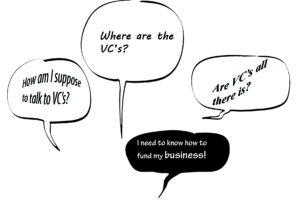Why 99.4% of Early-Stage Entrepreneurs Should Ignore VCs as a Capital Source
Many of my business friends and clients over the years have asked me how to find and approach VCs to get early stage funding. Frankly, I do my best to talk them out of it. This post is all about why.
Wanting to reach VCs is completely understandable! After all, from what we all read in news sources, it almost looks like VCs are the only game in town when it comes to funding fast-growing, successful businesses at the early stages. After all, if you want to BE the next Facebook, Google, Amazon, etc., then why not seek funding in the same way that Facebook did, right?
But unfortunately (or maybe fortunately for readers), actual entrepreneurial experience with VCs reveals some startling statistics about how VCs invest in early stage companies, and statistics confirm these 5 points about VC activities among early stage ventures.
- VCs fund VERY few companies at the seed and early stages. Believe it or not, in 2015, VCs made first rounds investments in only 156 seed stage companies and 1,072 early stage companies, for a total of 1,228 first round deals. Since 1995, the Price Waterhouse Coopers MoneyTree Report – published quarterly by PWC and the National Venture Capital Association – has profiled VC activity by industry, stage of financing, average deal size, geographic area and dollars invested (among other things). It also separates out deals that are first-time VC funding events for the companies involved (as opposed to follow on rounds). If you’re considering VC funding, I recommend that you study the Report carefully. I plan to post each quarter a fuller analysis of the MoneyTree Report, but if you want to check it out yourself, here’s the link – www.pwcmoneytree.com.
Now what about that 99.4% number above? According to the US Department of Commerce, in 2014, approximately 800,000 businesses were formed, of which about 200,000 employed at least one person. That 200,000 got financing from some source-whether by bootstrapping, bank financing, customer financing, personal savings, friends and family, or angel investors. So, 1,228 VC deals out of 200,000 new businesses amounts to 0.6 percent – and that’s the source of the 99.4% number above. The statistics are a little bit on the crude side, but overall they paint the picture: VCs provide a very small part of the business financing available.
- When VCs invest at early stages, they want to invest a lot more money than the great majority of companies can reasonably use – at those stages. Again, according to the Money Tree Report, in 2015, the average first round seed-stage investment was $4.8 million, while the average early stage investment was $5.3 million.
- VC investments are heavily weighted across a NARROW range of industries. For ALL VC deals (the MoneyTree Report doesn’t split out early stage and seed stage in their statistics by industry), just two major sectors accounted for TWO-THIRDS of all VC investments made.
Biotech and Medical Devices 20%
Software/ IT Services 46%
- VCs investments are heavily concentrated in Silicon Valley, New York and New England. In Q1 of 2016, these three geographical areas accounted for 74% of all VC money invested!
So, if you’re thinking of trying to attract financing, and are considering VC, the very first thing to do is figure out whether you are at all attractive to the VC world given your business and stage of development.
If you conclude – as I believe that 99.4% of entrepreneurs really should – that VC isn’t for you, then congratulations! This says NOTHING about whether you have the potential to be a successful high growth business – it just means that this source of financing is not likely to be good for you. And that’s good news, because other sources of financing are easier to attract AND often come at a lower cost.
Before you leave, could you please do me a favor? Please take a moment to leave a comment below answering this question:
What’s the biggest problem I’ve encountered so far in getting funding?
Many thanks and look out for the next post!
Good trekking,
Don “The Guide” Baker


